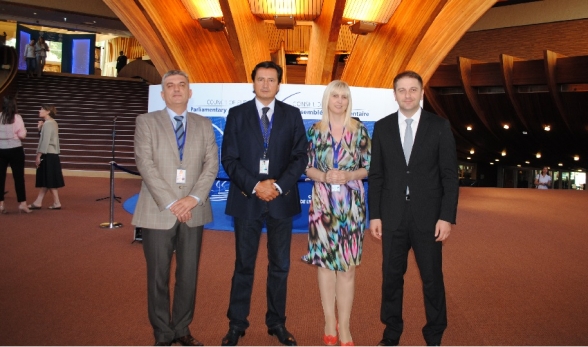In the first round of the election, Mr Jagland obtained 156 votes, while the other candidate, Ms Sabine Leutheusser-Schnarrenberger obtained 93 votes. Mr Jagland was President of the Norwegian Parliament from 2005 to 2009, and in 2009 he was elected Secretary General of the Council of Europe for a first term and the Chairman of the Norwegian Nobel Committee. New five-year term of office of the Secretary General will start on 1 October 2014.
On the second day of the Plenary Session of PACE, there were discussions on migration and the large number of irregular migrants who arrived on the Italian coast because of tensions in the South Mediterranean countries. Parliamentary Assembly of the Council of Europe expressed gratitude to South Mediterranean countries, Italy in particular, for great efforts made towards saving more lives at sea. Members agreed that there must exist zero tolerance towards lives lost at sea, and PACE recommended clear, binding and common standards for search and rescue operations and disembarkation of migrants. The Assembly also called for the creation of safe legal channels for migrants and securing unique asylum procedures. During the discussion on the arrival of migrants on Italian shores, efforts by the Italian authorities to respond to emergencies were commended, but it was underlined that there were yet further challenges within migration filed, why it was necessary to create a common action policy. PACE called on Italian authorities to secure reliable, fair and transparent system for identification of migrants in the moment of their arrivals and to step up its efforts in arresting and bringing to justice traffickers.
During the afternoon session, a discussion was led about violence in the media and through the media. It was stressed that any incitement to violence through the media must be prohibited, in accordance with international human rights standards. In order to combat this phenomenon, the Assembly asked governments, national parliaments and media service providers to take a set of measures. It was recommended that the Committee of Ministers of the Council of Europe prepare practical guidance for parents, teachers and providers of media services on how to deal with violence in the media.
During the debate on the reform of the Parliamentary Assembly of the Council of Europe, it was estimated that from 2011 a number of reforms to improve the functioning of organizational structure, effectiveness of PACE were implemented, as well as to create stronger links with national parliaments of the member states. The expectations of the Parliamentary Assembly of the Council of Europe and national delegations were fulfilled. However, it should be continued with reforms in the future, so as for the Parliamentary Assembly of the Council of Europe to get closer to all citizens of Europe, national parliaments and the media.
During today’s session, members were addressed by the President of Azerbaijan, Mr Illham Aliyev, who was paying an official visit to the Council of Europe. He pointed out that Azerbaijan assumed the six-month Chairmanship of the Committee of Ministers of the Council of Europe and assessed that that was an opportunity to contribute to the development of shared values of democracy and fundamental freedoms in that country. He reminded of the fact that following the break-up of the former Soviet Union, Azerbaijan suffered social unrest, economic turmoil, military defeat, loss of territory and even a civil war in 1993. However, the country has enjoyed rapid economic transformation and development in recent years and has become a bridge for intercultural and inter-religious dialogue in the region. President Aliyev said that Azerbaijan is prioritising implementation of reforms with a view to modernising the country and making progress sustainable, giving particular importance to fighting corruption and promoting education.
Members of the Delegation of the Parliament of Montenegro in the Parliamentary Assembly of the Council of Europe took part in the morning and afternoon sessions of the working bodies of the PACE: Committee on Political Affairs and Democracy, the Committee on Culture, Science, Education and Media, Committee on Migration, Refugees and Displaced Persons, the Committee on Equality and Non-Discrimination and the Committee on Social Affairs, Health and Sustainable Development.
The session will be continued tomorrow with discussions on efforts to create a better European democracy and the challenges faced by federal Europe, on parliamentary contribution to resolving the conflict in the Western Sahara and unified discussion of the identity and diversity of intercultural societies and integration of migrants in Europe, the phenomenon that requires a proactive, long-term and global action.
The Montenegrin delegation on the Summer Session is composed of: Mr Predrag Sekulić, Mr Damir Šehović, Mr Mladen Bojanić and Ms Snežana Jonica.








